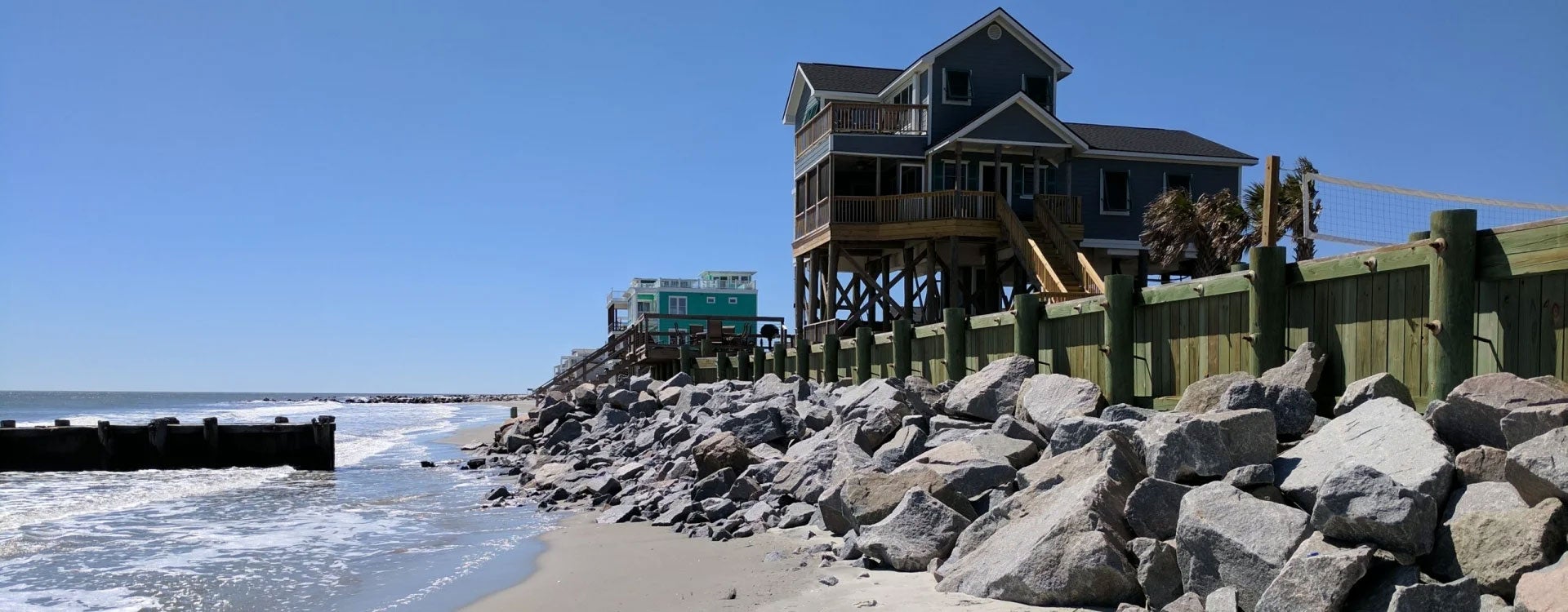Research Experiences for Undergraduates (REU)
Resilience and Adaptation to Coastal Change Across Communities (C2C)
Communities and coastlines are under threat from diverse hazards, such as extreme weather, sea level rise, and population growth. This is your chance to join an interdisciplinary team addressing these challenges through unique multi-institution Research Experiences for Undergraduates (REU) program hosted jointly by East Carolina University and the University of Puerto Rico – Arecibo.
Increasing the resilience of coastal regions and finding solutions to help communities adapt to change are problems that require an understanding of both the environment and people. In this unique interdisciplinary REU program you will be an important part of a team working to study natural and built environments from wide-ranging perspectives that span the natural sciences, engineering, and social sciences.
What makes this REU program unique?
- Coastal Emphasis: The impacts of climate change are producing devastating impacts on people and ecosystems in coastal regions. Learn how to use research to make a difference in our world!
- Interdisciplinary Approach: Available research projects span natural science, engineering, computer science, social science, and education. Understanding problems from different disciplinary perspectives is critical to finding solutions to the complex problems affecting coastal regions. Additionally, learning how to collaborate with people from different places, backgrounds, and perspectives is a critical professional skill needed to be successful in both research and industry!
- Science Communication: You will collaborate with other students in the REU to learn skills for communicating your scientific research to the general public as well as K-12 learners.
- Community Engagement: This REU has several projects focused on research being done right here in coastal North Carolina. During your time in the Outer Banks, you will learn how researchers here connect with the Outer Banks community to conduct and communicate their work.
- Professional Development Activities: You will have opportunities throughout the summer to learn skills and tools that will support your research efforts and make you competitive in your future career.
Quick FAQs:
What is a REU program and is it right for me?
REU is short for “Research Experiences for Undergraduates”, which is a program sponsored by the National Science Foundation that creates opportunities for undergraduate students to take part in authentic research activities over a focused period of effort, such as the summer. You will be placed in a cohort of other students, but work directly with a committed faculty member who will help you to ask questions, develop a research plan, and discover new knowledge! If you are curious about the world around you, starting to think about graduate school, and willing to work hard, then you should definitely consider taking part in a REU! REUs are for everyone, so if you are interested apply! You can learn more about REUs from the National Science Foundation’s REU website.
What type of research will I do as a part of this REU?
This is an interdisciplinary REU program, so there is a wide range of possible research areas that you could choose to work in. Refer to our Mentors and Projects page for details on projects available for the coming year. When you apply, you will choose which of the available projects are of most interest to you. We will do our best to match you with your top choices.
Where will I be located for the REU?
All REU participants will be hosted by East Carolina University at the Coastal Studies Institute on the Outer Banks of North Carolina. However, project mentors will come from ECU’s main campus in Greenville, NC as well as the University of Puerto Rico – Arecibo. Your mentor will depend on which project you are matched with.
How will COVID-19 impact my research experience?
The organizers of the REU and your research mentors are committed to providing you with a high-quality research experience regardless of what is happening with COVID-19. Most projects available have either been designed to enable fully virtual work to be possible or can be adapted to allow for virtual work. Conditions and restrictions on travel related to COVID-19 are constantly changing and being updated, so the degree to which REU participants can travel to the host location during the period between May-July will be evaluated on a continuing basis.
I usually need to work during the summer, so will I be compensated for taking part in this REU?
Yes! Each REU participant will receive a stipend of $7,000 for participating in the 10-week summer research experience. Additionally, participants will receive a stipend for cost of living and travel expenses.
Am I eligible to participate in this REU?
Applicants must be U.S. citizens or permanent residents and at least 18 years of age at the time of the REU program. Students are welcomed from all majors, but should have completed at least one year of undergraduate study and have at least one semester of study remaining toward their degree at the time of the program. Students attending colleges or universities with limited STEM research opportunities are particularly encouraged to apply. REU participants are encouraged to arrange for independent study credit through their home institutions.
ECU Land Acknowledgement
“We acknowledge the Tuscarora people, who are the traditional custodians of the land on which we work and live, and recognize their continuing connection to the land, water, and air that Greenville consumes. We pay respect to the eight state-recognized tribes of North Carolina; Coharie, Eastern Band of Cherokee, Haliwa-Saponi, Lumbee, Meherrin, Occaneechi Band of Saponi, Sappony, and Waccamaw-Siouan, all Nations, and their elders past, present, and emerging.”
Learn more about Indigenous Space and ECU: https://lwcc.ecu.edu/indigenous-land-acknowledgement/.

This material is based upon work supported by the National Science Foundation under Grant No. 2041425 from 2021-2024. All updates for 2025 is based upon work that is pending support by the National Science Foundation under Proposal No. 2447341. Any opinions, findings, and conclusions or recommendations expressed in this material are those of the author(s) and do not necessarily reflect the views of the National Science Foundation.


